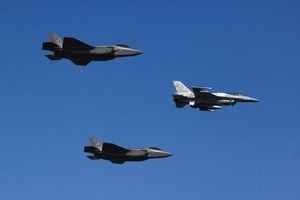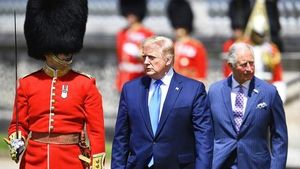On February 15, 2025, Dresden once again becomes the epicenter of tension as neo-Nazi groups are poised to hold their annual 'Gedenkmarsch' (memorial march) to commemorate the victims of WWII bombings. This year marks the 80th anniversary of the tragic event when the city was devastated by Allied airstrikes from February 13 to 15, 1945, resulting in the loss of around 25,000 lives. The commemoration, often utilized by right-wing extremists to promote historical revisionism, is expected to attract thousands.
The Saxon Office for the Protection of the Constitution has indicated significant mobilization among right-wing factions from across Germany and beyond, describing the anniversary as "a duty for the right-wing extremist scene to assemble". Reports suggest the arrival of extremists from different parts of Europe, drawn by the historical significance of the day.
Conversely, civil rights groups and various leftist organizations are gearing up for substantial counter-protests under the banner of 'Dresden WiEdersetzen'. These groups aim to not only oppose the neo-Nazi narrative but also to protect the memory of the bombing's victims from being distorted for extremist purposes. Organizers expect to rally as many participants as their right-wing counterparts to successfully block their route through central Dresden.
On the day of the march, heavy police presence is anticipated to manage the crowds and maintain public safety. Police are preparing for what they predict will be "far more dynamic" than the remembrance events earlier, especially considering the likelihood of confrontation. Streets around the main march route, including Ostra-Allee and the Hauptbahnhof, will have significant restrictions, with numerous blockades expected from counter-protesters determined to prevent the neo-Nazi procession.
Over the years, Dresden has witnessed these confrontations between extremist groups and their opponents, illustrating the city's fraught relationship with its war history. Historical occurrences have ranged from peaceful commemorations altered by violent upheaval to large gatherings focusing on promoting unity and remembrance over hate.
Notably, the city's leadership, including Oberbürgermeister Dirk Hilbert, has publicly condemned the distortion of the historical narrative surrounding the bombing. He stated, "This commemoration belongs to all of us—it must not be exploited for myth-making and distortion of history." Such sentiments underline the need for civic engagement against extremist rhetoric.
The authorities have implemented preventative measures, including the prohibition of specific items often associated with violence at rallies, such as metal rods, flares, and weapons. This year, the police will enforce restrictions between 6 AM and midnight on February 15, covering various sensitive areas across the city where the demonstrations are expected.
Community responses to the impending demonstrations have surfaced, encouraging citizens to participate actively and peacefully oppose right-wing extremism. Discussions around the significance of historical remembrance versus political exploitation remain at the forefront of community dialogues as protesters on both sides vie for attention.
With tensions building as the date approaches, many are left to ponder the outcomes of the day. Will the counter-protests succeed in subverting the neo-Nazi procession, or will the right-wing marchers, as they have done annually, dominate the streets of Dresden? Only time will tell.
The events of February 15 will provide not only a reflection on Dresden's painful past but also test the community's resolve to stand against the encroachment of extremist ideologies. Amidst the clamor for visibility and respect within the city, the struggle for the rightful memory of its citizens lost during the war remains critically significant, highlighted by the voices of active defenders against hate and division.



